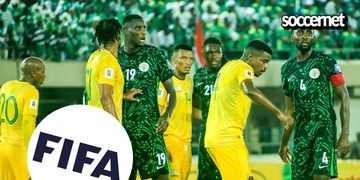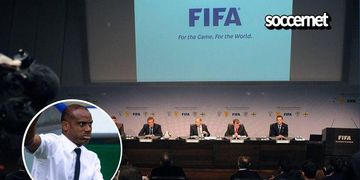Slammed with a two-year worldwide ban by the world-governing body, Chizoba made headlines for all the wrong reasons. But the Nigerian forward insists there is more to what was reported
Mid last year, the Bangladeshi Football Federation accused Nigerian striker Christopher Chizoba of engaging in match-fixing practices alongside teammates and officials of local side Arambagh Krira Sangha FC.
After investigations, the BFF imposed varying degrees of sanctions on the culprits.
Arambagh was demoted to the lower league. The club president and some directors were banned for life. Several players received multi-year bans.
Chizoba was suspended from participating in football activities for two years. It was a development that came as a huge shock for the footballer.
“A friend and former teammate sent me the link to the news story while I was preparing for a match,” Chizoba told Soccernet.ng.
“I was surprised and confused as I had not done anything wrong. Nobody had ever accused me of wrongdoing, whether in Bangladesh or India.
“I was very disturbed, but I managed to play for my club that day, and we won. I didn’t really take the news seriously after that.
“But when my club gave me a strong warning about the match-fixing issue, I realised it was a serious problem, and I started thinking of what to do next.”

The BFF may have known Chizoba as the skillful Arambagh striker who loves a laugh as much as scoring goals. What the federation perhaps did not know was that behind Chizoba's cool, calm mien is a time-tested resilience built during his late teens and forged by tough years spent working his way to the top.
Born in Lagos 30 years ago and raised by parents with Anambra roots, Chizoba's footballing skills were nurtured on the streets of the tough Lagos suburb of Ajegunle. He was only 17 when he was lured to India with a promise of abundance.
But instead of the promised plenty, the reality he faced in those early days in the second most populous nation in the world was akin to living hell on earth.
“It was very cold,” Chizoba recalls. “Very tough. I was just a boy and quite skinny. Some fellow Africans who saw me even asked, ‘what has this little boy come to do here?’”
“They wanted to contribute money for me to return to Nigeria.
“Even the contract was not what was promised. I called my family and cried to them that I wanted to return home. But they encouraged me to stay.”
And he stayed.
Hard work and holding firmly to his dreams helped during those rough days and lonesome nights.
Until he signed his first professional contract and the tide turned in his favour.

From one Indian club to another, Chizoba left trails of goals, becoming a household name and playing for one of the country's most notable clubs, Mohun Bagan.
In 2016, Chizoba moved to Myanmar to sign for Ayeyawady United, where he got the chance to play in the AFC – the Asian equivalent of the Europa League.
“Myanmar is smaller than India, but their football is more tactical, and the pay was good,” Chizoba adds.
He ended his maiden campaign with the club as the league's top goal scorer, securing a bigger payday with a switch to rivals Shan United.
A significant highlight of Chizoba's career followed as he fired United to their first-ever league triumph in 2017. And for the second consecutive time, he finished as the league's leading striker.
After failing to defend their league title, losing by a single point to eventual winners Yangon United in 2018, Chizoba left Shan United due to contractual disagreements.

The Nigerian attacker took in brief spells in Ethiopia and Guinea before landing in Bangladesh in 2021.
“I didn’t know the country's football had any history with match-fixing,” Chizoba offers. “I don’t focus on matters like that, really. I just wanted to get back to playing football after coronavirus kept me idle in Guinea for about seven, eight months.
“Although, there are times I suspected something was wrong. My team would score a goal, and our opponents would go up and score a goal too.
“But no club official, no teammate ever approached me to fix a match.”
The match-fixing drama gathered steam while he was still in Bangladesh. It had been instigated by the AFC and the BFF made their own investigations.
“It was all over the news. The media was saying everybody was guilty. But they (the BFF) only sanctioned the officials. Once they name an official, we would no longer see him come around the dressing room. But they never mentioned any player. They never accused me.
“And when I was to leave the country, they even cleared me. That was why the ban came as a total shock to me.”
But Chizoba had fought and survived so many personal battles almost singlehandedly to be scared of taking on the BFF.

With help from a lawyer-friend, Chizoba filed his appeal with FIFA's disciplinary committee.
FIFA's modus operandi is clear about the procedures to be taken by a federation before an extended worldwide ban is granted.
Article 66, section five of FIFA's disciplinary code stipulated that such a request would only be granted if the federation had cited the player properly, informed him of their decision, and allowed him to defend himself.
Chizoba did not receive any communication from the BFF throughout their investigations. He was accused, judged, and punished without hearing his side of the story.
It was on that error that the Nigerian built the base of his appeal.
Also attached to his appeal documents was evidence to show he had no Bangladeshi bank account, which means he could not have conducted any online transaction, whether legal or not.
No accusation of receiving cash or other assets – aside from his salary – had ever been levelled against him.
FIFA reviewed his case in early May and found no grounds to ban Chizoba from football globally.
On May 9, FIFA decided that the Bangladeshi Football Federation had acted improperly. The world football body upheld Chizoba's appeal and struck out his two-year worldwide ban.
While Chizoba remains banned in Bangladesh, the striker is free to play football everywhere else.
“I knew I would win the appeal,” he enthuses.
“I am so happy that it is now over, and I can concentrate on playing football again. That is what I know how to do best.”
And now that he can continue terrorising defenders, Chizoba reveals it is time to go chasing personal dreams.
“It is the dream of every Nigerian footballer to wear the green-and-white colours of the Super Eagles. I'm no exception.
“I know it’s difficult to have players from this part of the world play for Nigeria. Even Ahmed Musa and Odion Ighalo who have done it made their names in Europe before coming here. But nothing is impossible.”
The attacker's immediate plans, however, are more realistic and clear as daylight.
“I’m back in India, and Chizoba is a household name here. The clubs know me. The fans know me. It has never been difficult for me to get a club to play for in India,” Chizoba adds with a boyish grin that lights up his face often and the confidence of a man who has paid his dues.
There is barely any trace of that shy, lonely teen who arrived from Lagos more than a decade ago. But his career has been shaped by the decisions made by that gangly teenage boy.
And when pressed on the advice he would give his 17-year-old self arriving in India for the first time, Chizoba quipped, “I'd tell him, don’t spend more than two years in India!”
Eventful as his stay in Asia has been, Chizoba remains upbeat and optimistic. Many of his childhood dreams have been fulfilled. Yet he carries on with the firm conviction that the best is yet to come.


